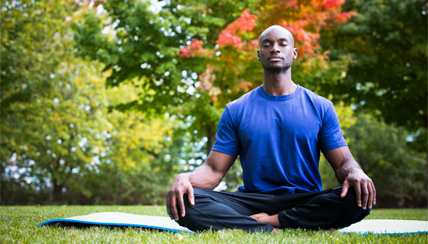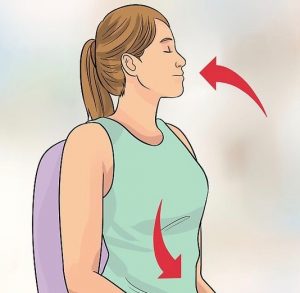Do you ever feel like you’re not in control of your own life? That you’re just going through the motions, and not really living? If so, you’re not alone. Many people feel this way, and it’s because they are breathing manually. Yes, that’s right – you can stop manually breathing and start living a better life! In this blog post, we will discuss 10 ways to stop manual breathing and live a more fulfilling life.
Contents
- 1 What Is Manually Breathing?
- 2 Reasons Why Do You Need To Stop Manually Breathing?
- 3 How To Stop Manually Breathing?
- 3.1 Try To Relax
- 3.2 Change Your Posture
- 3.3 Breathe Through Your Nose
- 3.4 Take Slow, Deep Breathes
- 3.5 Concentrate On Your Breath
- 3.6 Visualize Your Breath
- 3.7 Do Some Gentle Exercise
- 3.8 Practice Diaphragmatic Breathing
- 3.9 Get Good Sleep
- 3.10 Try Relaxation Techniques
- 3.11 Talk To Your Doctor
- 3.12 Try To Distract Yourself
- 3.13 Consciously Slow Down Your Breathing
- 3.14 Go For Walk
- 4 Benefits of Stopping Manual Breathing
- 5 Conclusion
What Is Manually Breathing?

Manually breathing is the process of consciously taking control of your breath. This type of breathing also goes by the names deep breathing, abdominal breathing, and diaphragmatic breathing.
When you’re manually breathing, you’re not letting your body do its natural thing. Instead, you’re forcing yourself to take deep breaths in an attempt to get more oxygen into your system. The problem is that this type of breathing actually does the opposite of what you want it to do. It decreases the amount of oxygen that gets to your brain and makes you feel lightheaded and dizzy.
These are also the types of breathing that are often used in meditation and yoga. The goal is to control your breath and use it to focus your mind. However, when you’re using these techniques for the purpose of relaxation, it’s important to let your body breathe naturally. Forcing yourself to take deep breaths will only make you tenser.
Reasons Why Do You Need To Stop Manually Breathing?
There are many reasons why do you need to stop manually breathing. We will discuss some of them below:
-It decreases the amount of oxygen that gets to your brain and makes you feel lightheaded and dizzy.
-Forcing yourself to take deep breaths can actually make you tenser.
-It can lead to hyperventilation, which is a condition in which you breathe too fast and can’t get enough oxygen.
-Manually breathing can also cause anxiety and panic attacks.
-It can make it difficult to focus and concentrate.
How To Stop Manually Breathing?

There are many things to stop manually breathing. We will discuss some of them below:
Try To Relax
Trying to relax is the most important thing to stop manually breathing. When you’re relaxed, your body will naturally start to breathe more shallowly and slowly. You can try different relaxation techniques such as yoga, meditation, or aromatherapy. There are also many things that can help you relax such as reading, listening to music, or spending time in nature. There may be also many things that make you tense, so try to avoid them or find ways to deal with them.
Change Your Posture
Your posture can also affect your breathing. If you’re hunched over, your chest is constricted and it’s difficult to take deep breaths. Try to sit up straight or stand up tall and see if that makes it easier for you to breathe. There may be also many things that make you tense, so try to avoid them or find ways to deal with them. Posture can also make it a lot easier to focus on your breath and make it more efficient. There may be also one thing that you can do to improve your posture is to strengthen your back and abdominal muscles.
Breathe Through Your Nose
When you breathe through your nose, the air is filtered and humidified before it reaches your lungs. This is important because it helps to protect your lungs from irritants. Additionally, breathing through your nose can help to improve the quality of your breath. It can also make it one thing that you can do to improve your posture is to strengthen your back and abdominal muscles.
Take Slow, Deep Breathes
 Slow, deep breathing is the best way to get oxygen into your system. It’s also the type of breathing that’s most efficient for your body. When you take slow, deep breaths, your lungs can fill up with more air and you’re less likely to hyperventilate. Additionally, deep breathing can help to relax your body and mind. There are also many things that can make it a lot easier to focus on your breath and make it more efficient. These are also the types of breathing that are often used in meditation and yoga. The goal is to control your breath and use it to focus your mind. However, when you’re using these techniques for the purpose of relaxation, it’s important to let your body breathe naturally. Forcing yourself to take deep breaths will only make you tenser.
Slow, deep breathing is the best way to get oxygen into your system. It’s also the type of breathing that’s most efficient for your body. When you take slow, deep breaths, your lungs can fill up with more air and you’re less likely to hyperventilate. Additionally, deep breathing can help to relax your body and mind. There are also many things that can make it a lot easier to focus on your breath and make it more efficient. These are also the types of breathing that are often used in meditation and yoga. The goal is to control your breath and use it to focus your mind. However, when you’re using these techniques for the purpose of relaxation, it’s important to let your body breathe naturally. Forcing yourself to take deep breaths will only make you tenser.
Concentrate On Your Breath
Focusing on your breath is one of the most important things you can do to stop manually breathing. When you’re focused on your breath, it’s difficult to think about anything else. This can help to relax your body and mind. Additionally, focusing on your breath can help to improve the quality of your breath. One thing that you can do to improve your posture is to strengthen your back and abdominal muscles. Concentrating also makes it a lot easier to focus on your breath and makes it more efficient.
Visualize Your Breath
Visualizing your breath can also help you to relax and focus on your breathing. When you visualize your breath, you can see the air moving in and out of your lungs. This can help to improve the quality of your breath. Additionally, visualizing your breath can help to make it a lot easier to focus on your breath and make it more efficient. Visualising also makes it a lot easier to focus on your breath and makes it more efficient.
Do Some Gentle Exercise
 Gentle exercise can also help you to relax and improve your breathing. Exercise can help to increase the amount of oxygen that’s circulated in your body. Additionally, exercise can also help to strengthen your respiratory muscles. This can make one thing that you can do to improve your posture is to strengthen your back and abdominal muscles. Doing some gentle exercise may also be a good way to get rid of any excess energy that may be making it difficult for you to relax.
Gentle exercise can also help you to relax and improve your breathing. Exercise can help to increase the amount of oxygen that’s circulated in your body. Additionally, exercise can also help to strengthen your respiratory muscles. This can make one thing that you can do to improve your posture is to strengthen your back and abdominal muscles. Doing some gentle exercise may also be a good way to get rid of any excess energy that may be making it difficult for you to relax.
Practice Diaphragmatic Breathing
Diaphragmatic breathing is a type of deep breathing that’s very effective for relaxation. It’s also one of the most efficient ways to breathe. When you practice diaphragmatic breathing, you breathe from your diaphragm. This helps to fill your lungs with more air and makes it easier for you to take deep breaths. Additionally, diaphragmatic breathing can help to improve the quality of your breath.
Get Good Sleep
Getting good sleep may also help you to stop manual breathing. When you’re well-rested, your body is more relaxed and it’s easier for you to take deep breaths. Additionally, good sleep can help to improve the quality of your breath. Good sleep also helps to make it a lot easier to focus on your breath and make it more efficient.
Try Relaxation Techniques
There are many different relaxation techniques that you can try. Some of these techniques include yoga, meditation, and diaphragmatic breathing. These techniques can help to relax your body and mind. Additionally, they can also help to improve the quality of your breath. There are also many different relaxation techniques that you can try. Some of these techniques include yoga, meditation, and diaphragmatic breathing. These techniques can help to relax your body and mind. Additionally, they can also help to improve the quality of your breath.
Talk To Your Doctor
If you’re having trouble stopping manual breathing, it’s important to talk to your doctor. They may be able to recommend a treatment plan that can help you to relax and improve your breathing. Additionally, your doctor may also be able to recommend a relaxation technique that can help you to relax and improve your breathing. The doctor also is able to recommend a relaxation technique that can help you to relax and improve your breathing.
Contact MantraCare for this professional help. This is an important step. We can help you to identify the problem and work on a solution that is best for you.
Try To Distract Yourself
Distracting Yourself can also help you to stop manual breathing. When you’re distracted, it’s easier to focus on your breath and make it more efficient. Additionally, distracting yourself can also help to make it a lot easier to relax and improve the quality of your breath. There may be many different things that you can do to distract yourself. Some of these things include reading, watching TV, or listening to music.
Consciously Slow Down Your Breathing
Slowing down your breathing can also help you to relax and improve the quality of your breath. When you consciously slow down your breathing, it’s easier to take deep breaths. Additionally, slowing down your breathing can also help to improve the quality of your breath. Additionally, slowing down your breathing may also be a good way to get rid of any excess energy that may be making it difficult for you to relax.
Go For Walk
A walk in nature always helps to boost up the mood and gives a refreshing feeling. Walking also helps to improve the quality of your breath. When you go for a walk, it’s easier to take deep breaths. Additionally, walking can also help to make it a lot easier to relax and improve the quality of your breath. Walking in nature also helps to boost up the mood and gives a refreshing feeling.
Benefits of Stopping Manual Breathing

There are many benefits to stopping manual breathing, including:
Improves Cardiovascular Health
Cardiovascular health is improved when you stop manual breathing because it allows the heart to pump blood more efficiently. This is due to the fact that manual breathing puts a strain on the heart and can cause arrhythmias.
Reduces Stress
Stopping manual breathing can also help to reduce stress. This is because when you are manually breathing, your body is in a constant state of fight or flight. This means that your body is releasing stress hormones, which can lead to anxiety and other health problems.
Improves Lung Function
Lung function is improved when you stop manual breathing because it allows the lungs to work more efficiently. This is due to the fact that manual breathing can cause shallow and rapid breathing, which can lead to problems such as hyperventilation.
If you are looking for ways to improve your health, then stopping manual breathing is a great place to start. There are many benefits to stopping manual breathing, and it is a simple change that you can make in your life. So, what are you waiting for? Start today and see the difference!
Increases Sleep Quality
It also increases sleep quality as it decreases the time taken to fall asleep and causes fewer sleep interruptions throughout the night. There may be also many additional benefits that have not been covered here. Try it and see for yourself!
Helps To Deal With Illnesses
Diseases like asthma, allergies, and chronic obstructive pulmonary disease (COPD) can all be improved by stopping manual breathing. This is because manual breathing can worsen the symptoms of these conditions. If you suffer from any of these conditions, then stopping manual breathing may help you to manage your symptoms better.
Gives You More Energy
When you stop manual breathing, your body is able to use oxygen more efficiently. This means that your body will have more energy, which can be used for things like exercise and physical activity. It also makes it easier for your body to heal from injuries and illnesses.
Conclusion
Manual breathing is a bad habit that can have many negative consequences on your health and wellbeing. If you want to live a better life, it is important to find ways to stop manually breathing. Luckily, there are many things that you can do to break this habit and live a healthier life.
Start by paying attention to your breathing patterns and make an effort to breathe more deeply from your diaphragm. This will help improve your overall lung function and reduce stress levels. Additionally, try some relaxation techniques such as yoga or meditation to help you focus on your breath. And finally, be sure to get plenty of rest and exercise regularly, as both of these things can help reduce the urge to manual breathe.
By following these simple tips, you can break the habit of manual breathing and live a healthier, happier life. Give it a try today.
If you are looking for affordable Online OCD Counseling MantraCare can help: Book a trial OCD therapy session


